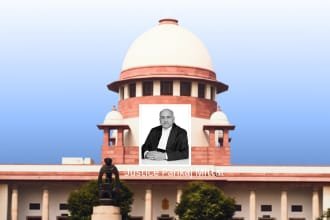Introduction
Motor accident compensation law in India has always been a subject of dynamic judicial interpretation. One of the most crucial aspects in awarding compensation is the determination of the victim’s income, especially when the victim is a student or unemployed at the time of the accident. Recently, in Sharad Singh v. HD Narang (2025), the Supreme Court of India addressed this issue and clarified that minimum wages cannot be fixed solely on the basis of educational qualification. Instead, the courts must consider the nature of work and realistic employment prospects of the victim.
This ruling not only enhances the jurisprudence on motor accident claims but also ensures that victims and their families are compensated fairly, without being restricted by rigid and narrow interpretations of minimum wage schedules.
Case Background
The case involved a 20-year-old B.Com final year student, who was also enrolled with the Institute of Chartered Accountants of India (ICAI). Tragically, he was rendered paraplegic after a motor accident in 2001 and remained bedridden for nearly two decades until his death.
The central question before the courts was: What should be the notional income of the victim for the purpose of calculating motor accident compensation?
Tribunal & High Court’s Approach
- The Motor Accident Claims Tribunal (MACT) and the Delhi High Court fixed the monthly income of the victim at Rs. 3,352/-, relying on the minimum wages notified for workmen at the relevant time.
- The High Court reasoned that although the victim had academic potential and was pursuing Chartered Accountancy, he had not yet qualified as a Chartered Accountant. Therefore, his income could not be assessed at that higher professional level.
Supreme Court’s Intervention
A bench comprising Justices K. Vinod Chandran and N.V. Anjaria disagreed with the restrictive approach taken by the lower courts. The Court observed:
“We were not convinced that the minimum wages would be determined on the basis of the educational qualification alone without reference to the nature of work carried on.”
The Court held that fixing wages merely on the basis of educational qualification ignores the practical employment opportunities the victim would have had after graduation.
Supreme Court’s Ruling
The Supreme Court clarified three critical aspects of income determination in motor accident cases:
- Educational Qualification is Not the Sole Factor
While education indicates potential, income assessment must be linked to the kind of work the victim could reasonably be expected to take up. Sole reliance on academic qualification is insufficient. - Nature of Work and Employment Prospects Matter
The victim, being a final year B.Com student, would reasonably have secured employment as an accountant upon graduation. Hence, his income should be pegged at a level consistent with such employment. - Application of Pranay Sethi Principles
In line with National Insurance Co. Ltd. v. Pranay Sethi (2017), the Court allowed 40% addition towards future prospects on the notional income.
On this basis, the Court:
- Fixed the victim’s monthly income at Rs. 5,000/- (2001 levels).
- Enhanced the overall compensation to Rs. 40.34 lakhs.
- Directed the insurer to additionally pay Rs. 20 lakhs towards verified medical expenses incurred by the victim’s parents over two decades.
Legal Significance of the Judgment
The decision in Sharad Singh v. HD Narang is a landmark ruling with far-reaching implications:
- Fairer Compensation for Students and Young Victims
The judgment recognizes that students and young victims may not yet be earning, but their educational path and realistic career prospects must be factored in. This prevents under-compensation. - Limits the Over-Reliance on Minimum Wage Schedules
Minimum wage notifications are often applied mechanically. This ruling ensures that courts look beyond the schedules and adopt a contextual approach, considering the actual nature of employment likely to be taken up. - Consistency with the Principle of Just Compensation
Motor accident laws are guided by the principle of “just compensation” under Section 168 of the Motor Vehicles Act, 1988. This judgment strengthens the idea that compensation should reflect realistic loss of earning capacity, not just statutory minimums. - Humanitarian Approach in Long-Term Suffering Cases
By directing an additional Rs. 20 lakhs for medical expenses incurred during the victim’s prolonged suffering, the Court has recognized the emotional and financial burden borne by families.
Comparative Judicial Trends
The Supreme Court’s reasoning in this case resonates with earlier judgments:
- Ramachandrappa v. Royal Sundaram (2011): Court held that notional income must be fixed keeping in view the nature of work, not rigidly tied to wage notifications.
- Magma General Insurance Co. Ltd. v. Nanu Ram (2018): Recognized the importance of considering familial loss and realistic economic prospects.
- Pranay Sethi (2017): Laid down structured guidelines for future prospects addition in motor accident claims.
Thus, Sharad Singh v. HD Narang is a natural progression in judicial thinking, ensuring fairness and adaptability in compensation law.
Conclusion
The Supreme Court’s judgment in Sharad Singh v. HD Narang (2025) is a progressive step in the field of motor accident compensation law. By holding that minimum wages cannot be determined solely on the basis of educational qualification, the Court has ensured that realistic employment prospects and the nature of work are central to income assessment.
This ruling will significantly impact how compensation is calculated for students, young professionals, and those on the cusp of entering the job market. It reinforces the principle that compensation must be just, fair, and reflective of real opportunities lost, rather than mechanically tied to minimum wage notifications.
For victims and their families, this judgment provides hope of receiving compensation that truly acknowledges the magnitude of their loss—financial, emotional, and human.
Also Read
Supreme Court Reprimands Magistrate for “Abdicating Jurisdiction” After Missing Deadline


